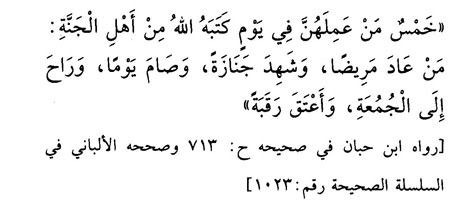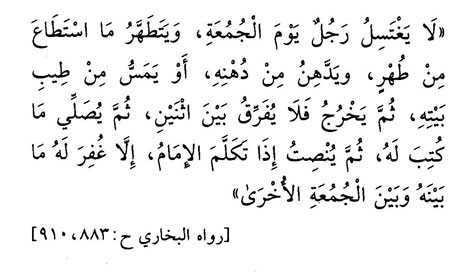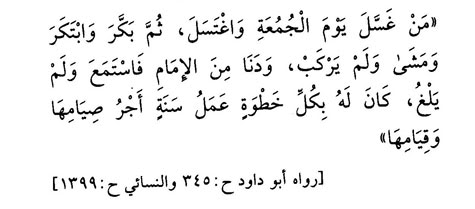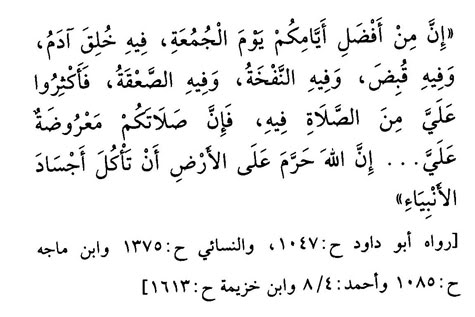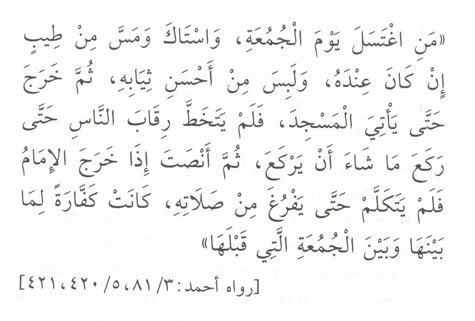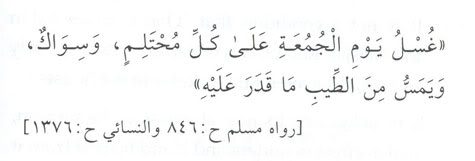
The Wonderful Library & Islamic Resource Center
World of Islamic Dawah: Islamic Library & Resource Center
|
|
| | Friday (Al-Jumu'ah) – A Day of Worship |  |
| | | Author | Message |
|---|
Amy-Amatullah
Bookroom Assistant


 |  Subject: Friday (Al-Jumu'ah) – A Day of Worship Subject: Friday (Al-Jumu'ah) – A Day of Worship  Wed Jan 04, 2012 10:51 am Wed Jan 04, 2012 10:51 am | |
|  Sharing this little book I have: Friday (Al-Jumu'ah) – A Day of Worship Complied by Darussalam Research Division.  Publishers Note Publishers Note All praise is due to Allaah, Who has blessed the Muslims and favored them by guiding them to the best of all days, Al-Jumu’ah (Friday), as their day of congregational worship. Allaah has placed many blessings and virtues in this day that are not found in other days. In performing the acts of worship that are legislated on the day of Al-Jumu'ah, the Muslim the gains forgiveness accumulated throughout the week. He comes together with brothers and sisters to be reminded of his duty to Allah and his fellow Muslims. He listens quietly to the sermon he reflects upon his own situation and his society around him. The day of Al-Jumu’ah is a day of celebration for the Muslims and it is considered an ‘Eed (Islaamic Holiday) just as the other two ‘Eeds (‘Eed ul-Fitr and ‘Eed ul-Adhhaa). In this brief booklet the author gives some very important reminders concerning the etiquettes of this blessed day of Al-Jumu’ah and how it should be received by the Muslims. He makes his points by using hadeeths of the Prophet and statements of the scholars of the past concerning the practices of Al-Jumu’ah. An added benefit is that all of the hadeeths have been referenced with brief notes concerning their grades of authenticity. Though concise, this booklet provides needed encouragement for every Muslim to truly contemplate upon the importance of this day and what it means to the worshipper of Allaah. We thank the author Abdul-Malik AI-Qaasim, for allowing us to share the benefit of this work with our English readers. We also thank Mr. Abu Muhammad Abdur-Ra‘uf Shakir and Mr. ‘Aqeel Walker for their help in editing arid translating this work. And Allaah is the Giver of success. Abdul Malik Mujahid | |
|   | | Amy-Amatullah
Bookroom Assistant


 |  Subject: Re: Friday (Al-Jumu'ah) – A Day of Worship Subject: Re: Friday (Al-Jumu'ah) – A Day of Worship  Wed Jan 04, 2012 10:56 am Wed Jan 04, 2012 10:56 am | |
| In the Name of Allaah, the Most Gracious,
the Most Merciful
Introduction All praise is due to Allaah, Who made succession of the night and day a sign for those who see clearly. I praise Him and thank Him for His immense blessings. I also send prayers of blessings and peace upon the noblest of the Prophets and Messengers, our Prophet Muhammad, and upon his family and all of his companions. To proceed: Nations continue to celebrate their holidays and enjoy their continuous occurrences. They feel delight when the names of these holidays are mentioned. Then how about the holiday of the Islaamic community and its worship of Allaah during it? Verily the weekly holiday for the Muslims is the day of Jumu’ah (Friday), which Allaah has honored this nation (the Muslims) with after He misguided the Jews and Christians concerning it. The Prophet  said, “AIlaah misguided those before us concerning the day of Jumu’ah. Thus, the Jews had As-Sabt (Saturday) and the Christians had Al-A had (Sunday) (i.e. as their days of worship). Then Allaah brought us and guided us to the day of Jumu’ah. Thus, He made the days (come in the sequence of)Al-Jumu’ah (Friday), As-Sabt (Saturday), and Al-Ahad (Sunday). Likewise, they (the Jews and Christians) will come after us on the Day of Judgement. We are the last (of these religions) of the people of this world and the first on the Day of Judgement to be judged before the rest of creation.” (Muslim) Jumu’ah is the day which the Messenger of Allaah  said about it, “The best day that the sun rises upon is the day of Jumu’ah.” (Muslim) This is the great day that some of the Muslims have made for long sleeping, relaxing and taking trips. Some women have designated this day for shopping in the market places and housework. Thus, they have become neglectful of the right of this day. We must know the value of this day and its special qualities so that we may devote ourselves to worship, obedience (of Allaah), increased supplicating and praying for blessings upon the Prophet  . Ibn Al-Qayyim said in his book Zaad Al-Ma’aad: “It was from his (the Prophet’s  ) guidance to magnify this day, honor it, and designate it for acts of worship, making it more special than other days. The scholars differ as to which is better between Jumu’ah and the Day of ‘Arafah...” Then Ibn Al-Qayyim counted more than thirty merits and virtues that this great day contains. From these special qualities and virtues are the following: To continue Insha Allah | |
|   | | Amy-Amatullah
Bookroom Assistant


 |  Subject: Re: Friday (Al-Jumu'ah) – A Day of Worship Subject: Re: Friday (Al-Jumu'ah) – A Day of Worship  Thu Jan 05, 2012 2:13 pm Thu Jan 05, 2012 2:13 pm | |
| 1. It is a recurrent holiday (‘Eed). Thus, it is forbidden to single it out for fasting in opposition of the practice of the Jews and Christians. This is also so that the servant (of Allaah) will have strength to perform its particular acts of obedience, such as prayer (i.e. Salaatul-Jumu’ah), supplications and other things. 2. It is the Day of Increase (Yawm ul-Mazeed). On this day Allaah will appear before the believers in Paradise (so they can see Him). Allaah says, “And We have more (for them, i.e. seeing Allaah).” (50:35) Anas (Radhi Allahu Anhu) said, “He (Allaah) will appear before them every Jumu’ah (Friday).” (*) This narration was recorded by Ibn Katheer in his Tafseer (Vol. 4) in explaining this verse, and he referenced it to Al-Bazzaar and Ibn Abee Haatim. A.W. 3. It is the best of days. The Prophet  said, “The best day that the sun rises upon is the day of Jumu’ah.” (Muslim) 4. It contains the hour when supplications are answered. The Prophet  said, “There is an hour during it (i.e. Jumu’ah) that no Muslim servant catches while he is standing and praying, asking Allaah for something, except that Allaah will give it (what he is asking for) Then the Prophet  made a gesture with to his hand to indicate how short that time is. (Al-Bukhari and Muslim) made a gesture with to his hand to indicate how short that time is. (Al-Bukhari and Muslim) to continue Insha Allah | |
|   | | Amy-Amatullah
Bookroom Assistant


 |  Subject: Re: Friday (Al-Jumu'ah) – A Day of Worship Subject: Re: Friday (Al-Jumu'ah) – A Day of Worship  Sun Jan 08, 2012 12:50 pm Sun Jan 08, 2012 12:50 pm | |
| 5. The virtue of performing righteous deeds during it. The Prophet  said, “There are five (deeds) that whoever does them in a day Allaah will write him among the people of Paradise: Whoever visits a sick person, joins a funeral prayer (or procession), fasts a day, goes to the Jumu’ah prayer, and frees a slave.” (Al-Albaanee graded this hadeeth authentic (Saheeh) in As-Silsilah As-Saheehah, no. 1023] The intent here is that his fasting coincides with the day of Jumu’ah without him intending to single it out for fasting. 6. It is the day when the Final Hour will be established. This is based on a hadeeth in which the Prophet  said, “The Hour will not be established except on the day of Jumu’ah.” (Muslim) 7. It is a day in which sins are expiated. It is narrated from Salmaan (Radhi Allahu Anhu) that the Messenger of Allaah  said, “No man performs complete bathing (Ghusl) on the day of Jumu’ah, cleaning himself as much as he is able, using some of his fragrance oil, or using some perfumed scent from his house, then going out without separating between two people, praying whatever has been decreed for him (of supererogatory prayer), and listening attentively when the Imaam is speaking, except that he will be forgiven for whatever (of sins) was between it and the other (i.e. previous) Jumu’ah.” (Al-Bukhaaree) 8. The person who walks to the Jumu’ah prayer will receive a great reward. The Prophet  said, “Whoever washes on the day of Jumu’ah and bathes (Ghusl), waking up early, setting out early, walking without riding, drawing near to the Imaam, listening and not speaking (or committing any unnecessary act of distraction), then he will receive the reward of a year’s fasting and standing in prayer for every that he took. (Aboo Daawood)(*) * This hadeeth was also recorded in Musnad Ahmad, the four Sunans, Ibn Hibbaan and Al-Haakim, and it was graded authentic (Saheeh) by Shaikh Al-Albaanee in Saheeh Al-Jaami’ A-Sagheer, Vol. 2, no. 6405. A.W. 9. From Jumu’ah to Jumu’ah is an expiation for the sins that occur between them plus three extra days of forgiveness. The Prophet  said, “Whoever bathes and then goes to Jumu’ah, praying what was decreed for him to pray (i.e. supererogatory prayer), listening attentively until the Imaam completes his sermon, praying with him, he be forgiven for whatever sins he committed between that Jumu’ah and the other (i.e. previous) Jumu’ah plus three extra days (of forgiveness).” (Muslim) 10. Dying during the day of Jumu’ah or its night (i.e. Thursday night) is from the signs person’s good end. The Prophet  said, “Whoever dies on the day of Jumu’ah or the night of Jumu’ah (i.e. Thursday night) will be protected from the trial of the grave. (Ahmad)[/color] (*) * This hadeeth was graded weak (Dha’eef) by Shu’ayb Al-Arna’oot in his checking of Al-Musnad, Vol.11, no. 7050, and graded authentic (Saheeh) by Ahmad Shaakir in his checking of Al-Musnad. The difference of opinion hinges upon the narrator, Baqiyyah bin Al-Waleed Al-Himsee, who was accused of making Tadlees, in which he would claim to hear a hadeeth from his Shaikh, when actually he had heard it from another student of his Shaikh who was unreliable.
A.W.  11. Giving charity during Jurnu’ah day is better than giving charity on any other day. Ibn Al-Qayyim said, “Giving charity during Jumu’ah day compared to giving it on other days of the week is like giving charity during the month of Ramadhaan compared to giving it in other months.” Then he said, “1 witnessed Shaikh ul-I slaam ibn Taymiyyah - may AlIaah bless his soul – when he would go out to Jumuah (prayer) taking whatever was in his house of bread or anything else and giving it in charity secretly (discreetly) on his way (to the Masjid). | |
|   | | Amy-Amatullah
Bookroom Assistant


 |  Subject: Re: Friday (Al-Jumu'ah) – A Day of Worship Subject: Re: Friday (Al-Jumu'ah) – A Day of Worship  Mon Jan 09, 2012 4:35 pm Mon Jan 09, 2012 4:35 pm | |
| There are other virtues and merits for this great day that we have not mentioned. Even if for only one of these virtues it would suffice a man to preserve and strive to maintain its practice. So how about when it contains all of these’ great virtues and numerous qualifies that are combined in it? This great day has etiquettes and Sunan (virtuous traditions), from among which are the following: 1. It is recommended for the Imaam to recite in the morning prayer (Fajr) of Jumu’ah day Surah As-Sajdah and Surah Al-Insaan in their entirety as the Prophet  used to do. This is probably due to what these two Surahs (chapters) contain of what was and what will be of the beginning of creation and the final return in the hereafter. They also contain a discussion of the gathering of the creation and their resurrection from the graves. The reason for their recitation is not due to the prostration (contained in Surah As-Sajdah) as some Muslims think. 2. Coming early to the Jumu’ah prayers. Many people are lax concerning this matter. Some of them do not get up from their bed or leave out of their house until after the Khateeb (person who gives the sermon) enters the Masjid to begin his sermon. Some others come just a few minutes before the Khateeb comes. Indeed many hadeeths have been reported that encourage coming early and being punctual about coming to the Jumu’ah prayer In one of them the Messenger of Allaah  said, “When the day of Jumu’ah comes there are angels at every door of the doors of the Masjid writing down the people in the order in which they come - the first ones first. So when the Imaam sits they roll up their scrolls and sit listening to the Thikr (i.e. the sermon). The one who comes early is like the one who gives a camel (as a sacrifice), then the one who comes next is like one who gives a cow (as a sacrifice), then the next is like one who gives a ram, then the next is like one who gives a chicken, and then the next is like one who gives an eggs” (Muslim) Thus, in this hadeeth the Prophet  made coming early to the Jumu’ah prayer like drawing near to Allaah by giving wealth (in charity). Hence, the one who comes early to the Jumu’ah prayer is like one who combines two acts of worship: bodily (i.e. physical) worship and worship with his wealth. This is like the reward that the person receives on the Day of Sacrifice (‘Eed ul— Adhhaa). It was from the habit of the Salaf (early generations) to come early to the prayer as some of the scholars have mentioned. They said, if the person comes to it early after the Fajr (morning) prayer and before the sun rises, then that is good.” Some scholars said, “It was seen among the first generations in the early morning (before dawn) and after the Fajr prayer that the roads would be filled with people walking along the paths and crowding them going to the congregational Masjid just like on the days of ‘Eed (the two Islaamic holidays). But then this (practice) faded away.” This time was filled with obedience (to Allaah), worship, recitation of the Qur’aan, remembrance of AlIaah and supererogatory prayers. It is reported concerning Ibn ‘Umar (Radhi Allahu Anhuma) that he used to pray twelve Raka’ahs (units of prayer) before the Jumu’ah prayer. Ibn ‘Abbaas (Radhi Allahu Anhuma) used to pray eight Raka’ahs before the Jumu’ah prayer. I remember seeing not long ago that one of the worshipers used to enter Al-Jaami’ Al-Kabeer (the Grand Mosque) in Riyadh for the Fajr prayer and he would not leave until after the Jumu’ah prayer was over. From that which helps one in coming to the Jumu’ah prayer early is avoiding staying up late the night before Jumu’ah (i.e. Thursday night). It is also helpful to prepare for it from the time of early morning and not be preoccupied by worldly things. Also, striving to be conscious of the great reward and blessings that coming early contains. One should make an effort to gain the abundant bounty and numerous rewards from Allaah for coming early. 3. Making an abundance of supplications for blessings upon the Prophet  The Messenger of Allaah  said, “Verily, from the best of your days is the day of Jumu’ah. During it Adam was created, and during it he was taken (i.e. he died). During it the Horn will be blown (to announce the end of the world), and during it everything will fall down dead. Therefore, send an abundance of prayers for blessings upon me during it (Jumu’ah), for verily your prayers are presented to me. Indeed Allaah has forbidden the earth from devouring the bodies of the Prophets.” (Ahmad) (*) * This hadeeth was also recorded in Aboo Daawood, and An-Nasaa ‘ee, Ibn Maajah, Ibn Hibbaan and Al-Haakim, and it was graded authentic (Saheeh) by Shaikh Al-Albaanee in Saheeh Al Jaami’ As-Sagheer, Vol. 1, no. 2212. A,W. 4. Complete bathing (Ghusl) on the day of Jumu’ah. This is due to the hadeeth of the Messenger of Allaah  , “When Jumu’ah comes upon one of you, let him bathe (i.e. make Ghusl)” (Al-Bukhaaree and Muslim) The scholars have differed concerning the ruling of bathing on Jumu’ah day, as to whether it is obligatory or recommended. The majority say that it is recommended. Therefore, it is commendable to perform complete bathing (Ghusl) on this day in order to fulfil this meritorious act. To continue Insha Allah | |
|   | | Amy-Amatullah
Bookroom Assistant


 |  Subject: Re: Friday (Al-Jumu'ah) – A Day of Worship Subject: Re: Friday (Al-Jumu'ah) – A Day of Worship  Sun Jan 15, 2012 1:06 pm Sun Jan 15, 2012 1:06 pm | |
| 5. Using perfume, cleaning the teeth with the tooth stick (Siwaak) and wearing one’s best clothes. Many people have become lax concerning these great Sunan (virtuous traditions) practices. Contrary to this, when they to parties or special occasions you see them perfuming themselves and wearing their best clothes! The Prophet  said, “Whoever bathes on the day of Jumu’ah, uses the tooth stick, applies perfume to himself if he has some, wears his best clothing, goes out until he comes to the Masjid, refraining from stepping over the necks of the people until he prays whatever he wishes to pray (of supererogatory prayer), then listening attentively when the Imaam comes out without speaking until he completes his prayer, then this will be an expiation for whatever sins he committed between this Jumu’ah and the one that preceded it.” (Ahmad) (*) The Prophet also  said, “Complete bathing (Ghusl) on Jumu’ah is mandatory for everyone who is past the age of puberty, and using the tooth stick (Siwaak) and perfume as much as he is able.” (Muslim) * This hadeeth was also recorded in Ibn Maajah and Al-Haakim, and it was graded authentic (Saheeh) by Shaikh Al-Albaanee in Saheeh Al-Jaarni’ As-Sagheer, Vol. 2, no. 6066. A.W. 6. It is recommended to recite Surah Al-Kahf This is due to the hadeeth of the Messenger of Allaah  “Whoever recites Surah Al-Kahf on the day of Jumu’ah he will be given a light between the two Jumu’ahs (i.e. that one and the next one).” (Al-Haakim) (*) “Whoever recites Surah Al-Kahf on the day of Jumu’ah he will be given a light between the two Jumu’ahs (i.e. that one and the next one).” (Al-Haakim) (*) It is not a condition that it has to be recited in the Masjid. Rather, it is better to recite it as early as possible, even if one recites it in the house. * This hadeeth was also recorded in Sunan Al-Baihaqee and graded authentic (Saheeh) by Shaikh Al-Albaanee in Saheeh Al-Jaami’ As-Sagheer, Vol. 2, no. 6470. A.W. 7. It is obligatory to pay attention to the sermon, make effort to understand it and benefit from it. The Prophet  said, “If you say to your companion, ‘pay attention’ (or listen) on the day of Jumu’ah while the Imaam is giving the sermon, verily you have spoken nonsense (chattered). (Al-B ukhaaree and Muslim) 8. Being careful not to step over the necks of people and bother those who are praying. The Prophet  said to a man who stepped over the necks of the people on the day of Jumu’ah while he (the Prophet  ) was giving the sermon, “Sit down! For you have bothered (the people) and you have come late.” (Ahmad) (*) People usually do not do this (stepping over the necks of others) except for those who come late. *This hadeeth was also recorded in Aboo Daawood, A -Nasaa’ ee, Ibn Hibbaan, Al-Haakim and Al-Baihaqee, arid it was graded authentic (Saheeh) by Shaikh Al-Albaanee in Saheeh Al-Jaami’ As-Sagheer, Vol. 1, no. 155. A.W. 9. When the prayer is finished do not miss offering four Raka’ahs of prayer in the Masjid after the legislated words of remembrance (that are said after all obligatory prayers), or two Raka’ahs in your home. When you have left the Masjid and taken your share of the reward and good deeds if Allaah wills think about the statement of Ibn Rajab, in the book Lataa’if Al-Ma’aarif when he said, “Some of them (the Salaf) when they returned from Jumu’ah in the heat of noon would be reminded of the dispersing of mankind from the Station of Reckoning to Paradise or the Hell-fire. For verily the Final Hour will be established on Jumu’ah day; and that Day will not reach its midpoint until the people of Paradise will take a nap in Paradise, and the people of the Hell-fire will take a nap in the Hellfire. Ibn Mas’ood said this and then he recited the verse, The dwellers of Paradise will, on that Day, have the best abode, and have the fairest places of repose (rest, napping).’ (25:24)” Strive to seek the hour when supplications are answered. The most correct view concerning this is that it is the last hour of the day on Jumu’ah (after ‘Asr and before sunset). Therefore, call upon your Lord, humble yourself before Him and ask Him for your needs. Show Him goodness from yourself (during this hour), for indeed it is an hour that the Prophet said about it, “Verily during Jumu’ah there is an hour that no servant (of AIlaah) catches while he is standing in asking Allaah for anything, except that Allaah will give it to him. (Al-Bukhaaree and Muslim) May Allaah make us and you of those who worship Him in the manner that He deserves to be worshipped. May prayers of blessings be upon our Prophet Muhammad  his family and all of his companions. To continue Insha Allah | |
|   | | Amy-Amatullah
Bookroom Assistant


 |  Subject: Re: Friday (Al-Jumu'ah) – A Day of Worship Subject: Re: Friday (Al-Jumu'ah) – A Day of Worship  Sun Jan 15, 2012 1:32 pm Sun Jan 15, 2012 1:32 pm | |
| Hadeeths Related to Al-Jumu’ah Narrated ‘Abdullah bin ‘Umar and Aboo Hurairah (Radhi Allahu Anhuma): They heard the Messenger of AIlaah  say on the planks of his pulpit, “People must stop neglecting the Friday prayers, or else Allaah will seal their hearts and then they will be among the heedless.” (Muslim) Narrated Jaabir bin ‘Abdullah (Radhi Allahu Anhu): Whenever the Messenger of Allaah delivered a Khutbah (religious talk), his eyes would become red, his voice rose and his anger would become severe, as if he was like a person warning an army and saying, “The enemy is going to attack you in the morning or in the evening.” And he would say, ‘Amma ba’du (to proceed), the best of speech is the Book of Allaah, and the best of guidance is the guidance of Muhammad. And the worst of matters are the newly introduced matters, and every innovation is a misguidance.” (Muslim) Narrated Jaabir (Radhi Allahu Anhu): A man entered the mosque on a Friday when the Prophet  was delivering the Khutbah (religious talk, sermon) and he (the Prophet  ) said, “Have you prayed?” He replied, “No.” He (the Prophet  ) said, “Stand up and pray two Rak’ahs.” (Al-Bukhaaree and Muslim) Narrated Aboo Hurairah (Radhi Allahu Anhu) The Messenger of Allaah  said, “When anyone of you prays the Jumu’ah prayer, he should pray four optional Rak’ahs afterwards.” (Muslim) Umm Hishaam bin Haarithah said (Radhi Allahu Anha), “I did not take (i.e. learn) Surah Qaaf except from the tongue of the Messenger of Allaah  , who used to recite it every Friday on the pulpit when he delivered the Khutbàh (religious talk) to the people.” (Muslim) Narrated ‘Ammaar bin Yaasir (Radhi Allahu Anhuma): He heard the Messenger of Allaah say, “The length of man’s prayer and the shortness of his Khutbah (religious talk) are a sign of his understanding (of the religion).” (Muslim) | |
|   | | Sponsored content
 |  Subject: Re: Friday (Al-Jumu'ah) – A Day of Worship Subject: Re: Friday (Al-Jumu'ah) – A Day of Worship  | |
| |
|   | | | | Friday (Al-Jumu'ah) – A Day of Worship |  |
|
Similar topics |  |
|
| | Permissions in this forum: | You cannot reply to topics in this forum
| |
| |
| |
|









 Please check our
Please check our 







 said,
said, 






